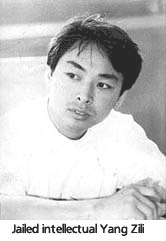New York, May 23, 2001 — The Committee to Protect Journalists (CPJ) sent a letter today to Chinese president Jiang Zemin, condemning his government’s decision to bring subversion charges against four Beijing intellectuals who had used the Internet to publish articles and essays on politically controversial topics.
Yang Zili, a writer and Web developer, Xu Wei, a reporter for the newspaper Consumer Daily (“Xiaofei Ribao”), Zhang Honghai, a free-lance writer, and Jin Haike, a geologist by profession, were charged with subversion on April 20, according to the Hong Kong-based Information Centre for Human Rights and Democracy. The four were active participants in the New Youth Study Group (“Xin Qingnian Xuehui”), an informal gathering of individuals who explored topics related to political and social reform and used the Internet to circulate relevant articles.
“We call for the immediate and unconditional release of Yang Zili, Xu Wei, Zhang Honghai, and Jin Haike,” CPJ executive director Ann Cooper wrote in the letter to President Jiang. “CPJ is deeply disturbed that the Chinese government continues to wield subversion charges against people who publish politically controversial views.”
Yang and Xu were detained separately on March 13. Less is known about the circumstances under which Zhang and Jin were detained, but they were also taken into custody around mid-March, according to the Information Centre.
Yang, the most prominent member of the group, is well known in liberal academic circles for his technological expertise in evading government firewalls and setting up e-mail accounts that could not be monitored, according to a recent report in The New York Times. His Web site, titled “Yang Zili’s Garden of Ideas” (“Yangzi de Sixiang Jiayuan”), featured poems, essays and reports by various authors on subjects ranging from the particular shortcomings of rural elections to broad discussions of political theory. Authorities shut down the site following Yang’s arrest, according to a well-informed source in the U.S. who did not wish to be identified but has set up a mirror site (www.bringmenews.com/China/freeyzl/mirror/) that remained accessible as of today.
When Xu was detained on March 13, authorities confiscated his computer, reporting equipment, and books, according to an account published online by his girlfriend, Wang Ying. Public security officials also ordered the Consumer Daily to fire Xu, according to Wang’s account. The newspaper has refused to discuss Xu’s case with reporters, according to The Associated Press.
With local print and broadcast media under Chinese Communist Party control, the Internet has been a crucial venue for independent news and opinion in the country. The Chinese government has, however, attempted to check the power of the Internet by issuing a slew of regulations that criminalize the online publication of “illegal content,” a vague term that can be applied to any news produced without official permission.
The arrests of Yang Zili, Xu Wei, Zhang Honghai, and Jin Haike come amid an apparent government crackdown on reform-minded intellectuals. In recent months, notably, authorities have detained at least five overseas-based Chinese academics. On May 3, 2001, CPJ named President Jiang Zemin to its annual list of the 10 Worst Enemies of the Press.
